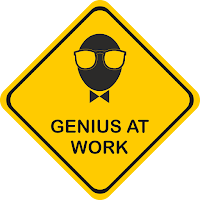 |
| [one-eye*] |
All businesses, especially freelancers, seek to market their services
with the maximum efficiency at the lowest cost. One of the least used techniques
is speaking at conferences and other public events. Not only is it one of the
most effective ways of making a business known but it also involves the least financial investment, making it available to the most cash-starved freelancer. Moreover, the challenges
involved with public speaking are far less intimidating than they seem. In
practice, racking some courage and investing some time can efficiently and
effectively lead to many new customers.
.png) |
| ["Concentration" game" with two penguins shown] |
The spoken word, especially face-to-face, is the most effective form of
marketing. In reaching out to potential customers, the goal is to create a
positive impression such that they will remember your name when they require
that service. Written materials, whether advertisements or informational posts,
have limited effectiveness since the average person sees thousands of words
every day. Thus, it takes extraordinary text and/or timing to leave an
impression on any given individual. By contrast, potential customers have a significantly
better retention of spoken words. Adding a face and a personality further strengthens
the impact of any message in that we remember not only the content but connect
it with a specific person. Thus, an oral presentation to an audience, especially
a live one as compared to through video means, leaves a strong impression, the
goal of all marketing efforts.
 |
| [small red purse] |
The financial cost of public speaking is potentially the lowest of all
forms of marketing. Advertising, whether in written media such as newspapers or
audiovisual forms such as TV, can be quite expensive, far beyond the budget or
justifiability of a small service provider. For the most part, only major
corporations invest in regular advertising on these means. By contrast,
expressing your message orally and directly involves very little direct cost whether the forum is a conference or a social media such as TikTok. In some
cases, the conference even pays the presenter. Public speaking mainly involves a
time investment for planning, preparation and performance. All businesses
regardless of size and budget can choose to invest that time.
That speaking directly to the public is an effective means of marketing
is intuitively clear to many if not most freelancers and other business people.
Their issue is the ability to actually stand up (or sit down as it may be) and
do it, whether out of the belief that they have nothing to say, are not natural
speakers, will make a fool out of themselves or they are simply too shy. Based
on my 30 years of experience teaching public speaking, these issues are either
irrelevant or easily managed, meaning that almost any person can make a
professional oral presentation.
 |
| [Owl on thick book] |
For reasons of insecurity, doubt or ignorance, many knowledgeable people
do not recognize their own expertise. Yet, due to their background or natural
tendency, they find a certain task to be quite straightforward and obvious and
assume that others find it similarly easy. In practice, each person is unique
in terms of talents and weaknesses. The result is the terms simple and complicated
are subjective, i.e., personal. Therefore, many peers and potential
customers will appreciate clear information on a given subject because they do
not understand it or need more information. While it is true that that given
speakers may not be the only or even the best source of information, they are
the expert in that place and time. Thus, even entrepreneurs with little business
experience can educate their peers and customers on specific matters, thus creating a positive image of themselves. It is
merely a matter of identifying a relevant subject.
 |
| [ball with a scared face] |
The myth that only natural speakers should make presentations also
discourages potential quality speakers. From my long experience teaching public
speaking to first-year engineering students in Israel, the percentage of people
with a natural gift of gab is quite small, clearly less than 5%. However, with
minimal coaching and practice, a very high percentage of normal-range individuals
become effective public speakers. Moreover, it is important to remember that
even professionals are nervous before the actual event. However, they have
learned that this tension is acceptable and manageable. Likewise, business
people wishing to market themselves and their services can manage their worries
and make an effective presentation even if they are not especially gifted in
that area.
 |
| [genius at work sign] |
In practice, for the most part, speaking proficiency involves managing
nerves, proper preparation and appropriate subject matter. In terms of avoiding black out, the key
is ratio is nervousness to preparation time. In other words, the more insecure
a person is about public speaking, the more that person needs to practice.
When “showtime” comes, the practice pays great dividends. I actually practice
much more now than I used to as I want better results. Preparation involves
understanding and organizing the material and smoothing out and mastering the
connection between the various topics in the presentation. Once a lecturer is
certain of the entire content, it is possible to focus on and connect with the
audience. As for subject matter, most people cannot fake expertise. People
speak with confidence on those matters that they thoroughly understand and
enjoy discussing. With proper psychological and physical preparation as well as
subject choice, the scary monster of standing up in front of people turns out
to be a manageable process.
.png) |
| [shy woman] |
Many people with much knowledge to share do not speak in public they
believe their lack of comfort or shyness does not allow it. No business person,
freelance or salaried, feels comfortable in all aspects of their job at any
time of their career. In many cases, circumstances force people to deal with
their fear of the unknown, whether it is accounting or personnel management.
The refusal to face these fears prevents some people from reaching their full
potential. It does not mean that the task will necessarily become their
favorite but instead it will not interfere with their performance. If a
freelancer has no budget for effective advertising and needs more customers,
the refusal to speak in public may limit their potential growth. Clearly, not
dealing with an issue is a choice but not necessarily an ideal one. As for shyness,
many years ago, I was a sales manager for an advertising company and
interviewed a certain sales candidate whose speaking skills as evidenced by his
interview were so bad that I shortly rejected him as a candidate in my head.
However, his answer to my last question completely changed my mind. I asked him
to tell me about a special event in his life. His description of skiing in the
Alps was so fluid and passionate that I hired him. The moral of this story is
that when talking about something they enjoy, people forget their shyness and
become effective public speakers. A person can be very shy at home and in
social situations but project a strong presence in certain work situations. Any
person can be persuasive.
 |
| [frog with crown] |
In short, despite the general perception, any business person can
effectively and efficiently make a positive impression on peers and potential
customers by speaking directly to them at conferences and public events as well as
on video social media. It is possible to overcome issues such as lack of
experience and innate fear of public speaking as these issues are quite
manageable. A person does not even have to be the leading expert either. When
speaking directly to people, the presenter becomes the primary source of
knowledge. As the expression goes, in the kingdom of the blind, the one-eyed
are kings, which makes for great marketing.
* Picture captions allow the blind to fully access the Internet.
Picture credits: Pixabay


.png)




.png)















